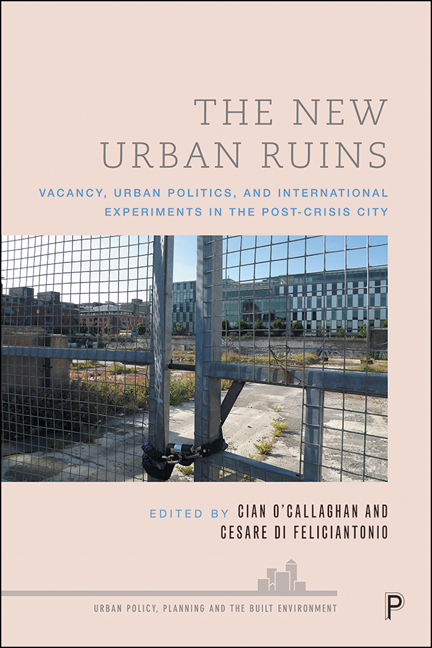Book contents
- Frontmatter
- Contents
- List of figures and tables
- Notes on contributors
- Acknowledgements
- Introduction
- PART I Rethinking ruination in the post-crisis context
- PART II The political economy of urban vacant space
- PART III Reappropriating urban vacant spaces
- Conclusion: Centring vacancy – towards a research agenda
- Index
2 - Dignifying the ruins: a former Jewish girls’ school in Berlin
Published online by Cambridge University Press: 13 May 2022
- Frontmatter
- Contents
- List of figures and tables
- Notes on contributors
- Acknowledgements
- Introduction
- PART I Rethinking ruination in the post-crisis context
- PART II The political economy of urban vacant space
- PART III Reappropriating urban vacant spaces
- Conclusion: Centring vacancy – towards a research agenda
- Index
Summary
Introduction
De Silvey and Edensor (2013: 467) define ruins as ‘structures and places that have been classified (by someone, at some time) as residual or unproductive, but equally most of these sites remain open to appropriation and recuperation’. Urban ruins, therefore, are more than physical by-products of capitalist ‘creative destruction’ (Harvey, 1985); they may offer the touchstone for alternative imaginings of the city. As O’Callaghan et al (2018) argue, urban ‘remainders’ have the potential to create spaces of discursive and material struggle over questions of social and spatial justice, such as when alternative communities create urban commons during times of economic austerity. However, what happens when inhabitants are violently removed from a ‘productive’ place, which is made into a ruin by racist policies? Years later, what does it mean to ‘inherit’ ruins of spatial injustice – for groups and individuals that were traumatised, for bystanders, and for perpetrators?
This chapter contributes to discussions of the ‘dynamic and unsettled’ nature of ruins (DeSilvey and Edensor, 2013: 466) by considering their complex and shifting geopolitical temporal-spatial relations in cities marked by extreme forms of violence and spatial injustice, including forced removals and genocide. I focus on a rather mundane ‘ruin’, a former Jewish girls’ school in Central Berlin that was created by the virulent anti-Semitism of National Socialism. Located on Auguststrasse in the central residential district, Berlin-Mitte, the heart of Jewish Berlin, the school was closed in 1942 by the Nazis and later converted to a wartime hospital. It survived the bombings of the Second World War, and was reused by the former German Democratic Republic (GDR) as the ‘Bertolt Brecht’ grammar school until 1966. In post-reunification Berlin, the building stood empty until 2006, when it was briefly reanimated for a few months by artistic exhibitions while its ownership was being determined. One exhibition was the Hannah Arendt Denkraum (‘Hannah Arendt Thinking Space’) (hereafter, the Denkraum), which marked the 100th anniversary of the political philosopher Hannah Arendt's birthday. Open from 14 October to 19 November 2006, this ‘experimental art project’ invited artists and visitors to explore Arendt's writings on free thought and democracy in a then empty building with a not-yet clear future land-use and property status (Funken, no date).
- Type
- Chapter
- Information
- The New Urban RuinsVacancy, Urban Politics, and International Experiments in the Post-Crisis City, pp. 35 - 52Publisher: Bristol University PressPrint publication year: 2021

